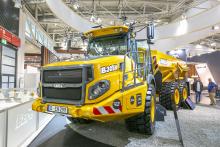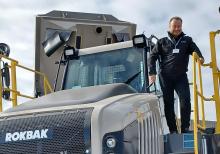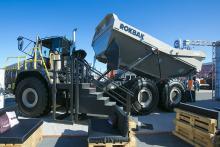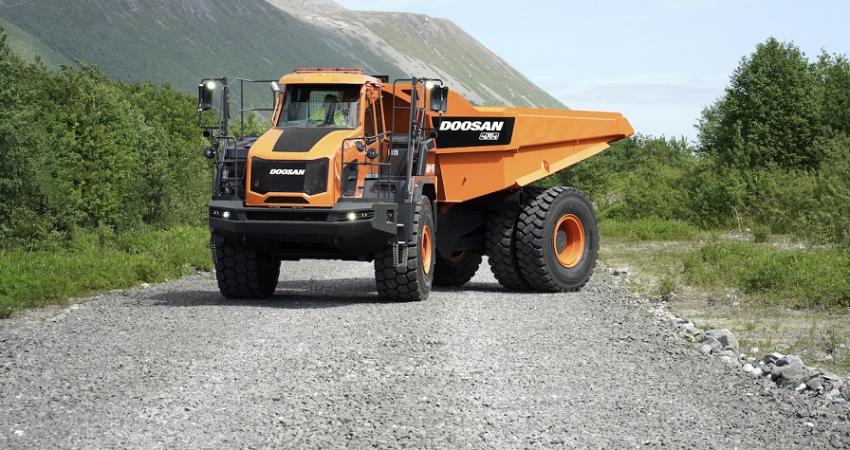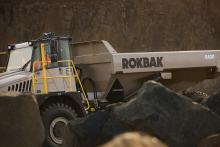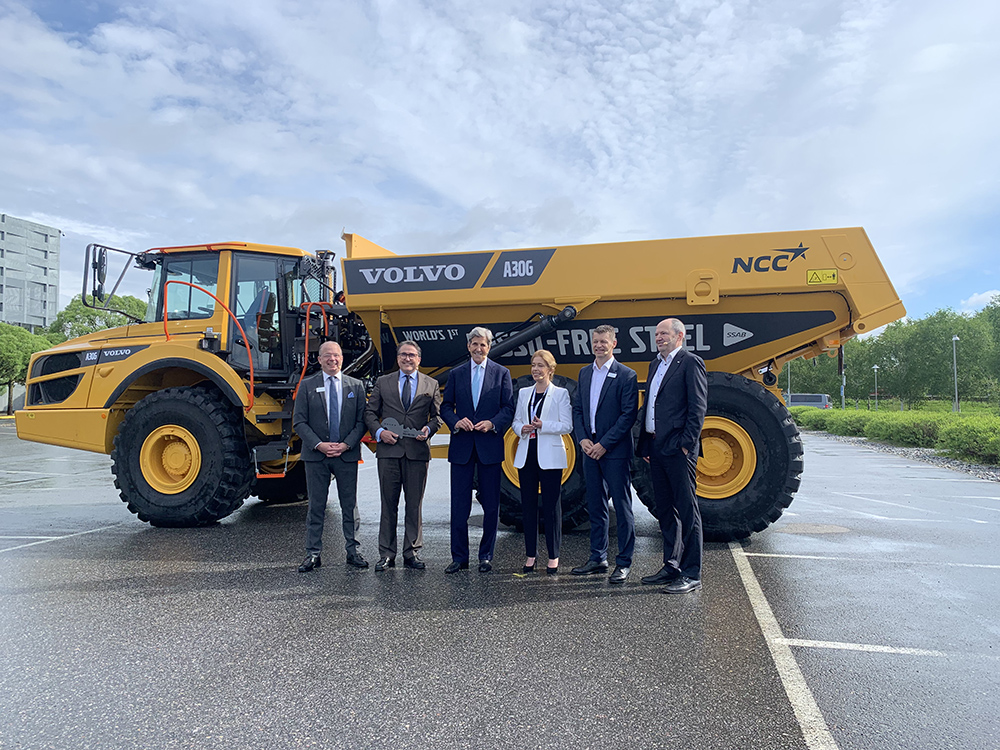
Volvo Construction Equipment (Volvo CE) has become the first manufacturer to deliver a construction machine built using fossil-free steel to a customer. The Sweden-based manufacturer says the move demonstrates the fast-tracking of innovation to real-world solutions as companies across the value chain come together to drive change.
The A30G articulated hauler built using fossil-free steel was handed over by president of Volvo CE Melker Jernberg to long-standing customer NCC on June 1, at a ceremony hosted by LeadIt – the Leadership Group for Industry Transition – in conjunction with the United Nations environmental meeting Stockholm +50. It was attended by John Kerry, US Special Presidential Envoy for Climate (pictured third from left) and Annika Strandhäll, Swedish Minister for Climate.
The move comes just nine months after the company unveiled the world’s first vehicle concept using fossil-free steel, as part of the testing of the implementation in an ordinary production setup. While commercial introduction is expected to be gradual with selected customers, this speedy first handover is an important milestone in the group’s ambition to drive industry transformation towards global climate goals. The A30G is produced at Volvo CE’s Braås facility in Sweden, using the existing manufacturing process, with fossil-free steel from Swedish steel company SSAB.
“We are sure that to succeed in decarbonising the construction industry, actors in the value chain will need to collaborate and act,” Jernberg commented. “Thanks to our strong partnerships with other driven and forward-thinking companies, we are now able to lead the change towards fossil-free construction and be the first to deliver a machine built using fossil-free steel to a customer. Turning commitments into actions is key to building the world we want to live in.”
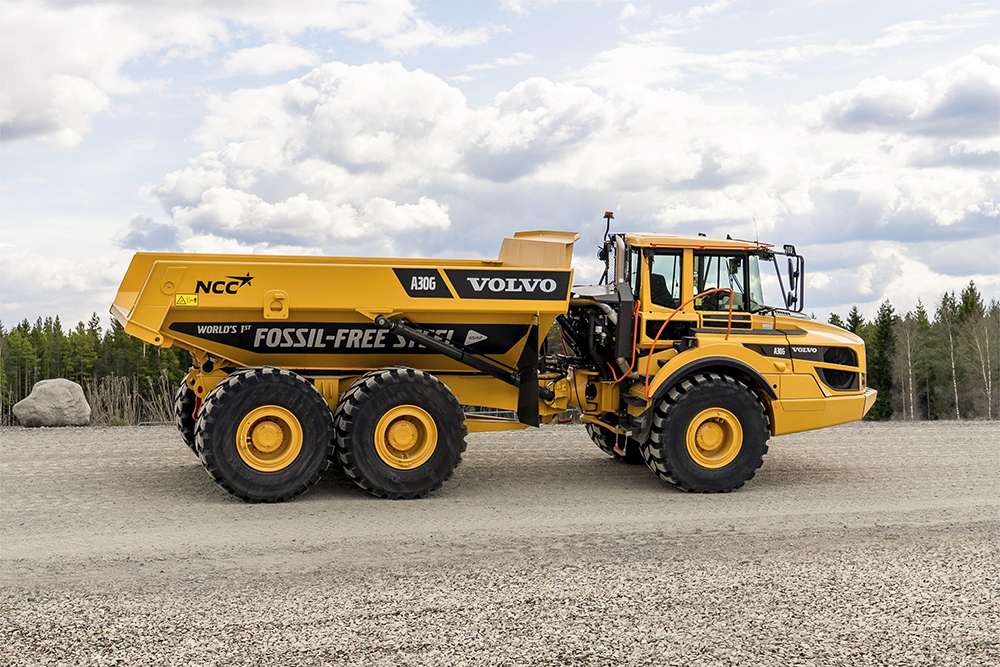
Tomas Carlsson, CEO and president of NCC, said: "NCC has a firm commitment to contribute to sustainable development. We are working determinedly and systematically to reach that target, which includes selecting machines that live up to our high demands. As demonstrated in this great example, it takes strong and proactive partnerships between several players to make the sustainable shift possible."
As part of its Science-Based Targets commitment, Volvo CE is set to achieve net-zero greenhouse gas emissions by 2040. Alongside the electrification of its machines, the company says it recognises the importance of reducing its carbon footprint across its entire value chain. This includes the raw materials used in its products, of which steel is a major component. The production using fossil-free steel in Volvo CE’s machines and components will be gradual and depend on aspects such as steel availability.
Employees at Motherwell, Scotland-based Rokbak have been celebrating the articulated haul truck brand’s one-year anniversary. Marking the occasion, managing director Paul Douglas has revealed the full story behind the rebrand. Keeping one of the biggest construction equipment stories of 2021 under wraps was not an easy task, so how did Douglas and his team keep the rebranding of Terex Trucks a surprise for so long? The answer lies in good old-fashioned hard work from a dedicated and highly skilled team.
“I was amazed that it didn’t filter out; I kept thinking I’d see something on social media,” Douglas admitted. “As the project progressed, it pulled in more employees and more departments – there wasn’t a single function in the business that didn’t have to get involved.
“For instance, we had to try the new colour scheme out in the paint shop, and we said it was a customer-specific colour – which is something we’ve done for our customers before. Then, before the launch, we had to take the RA30 and RA40 to a quarry to take photos for the marketing materials. It was incredible how everyone in our team, the dealers and our external partners worked together to ensure it remained confidential.”
The COVID-19 pandemic and the essential lockdowns that came with it caused difficulty but ironically the pandemic actually helped to keep the news under wraps. With no events or exhibitions to attend, and no customers or journalists visiting the Motherwell factory, the risk of anyone finding out was greatly diminished.
“We didn’t have to drop the Terex Trucks name, but we had overrun on the initial agreement,” Douglas explained. “For the first few years changing our name wasn’t a high priority, as we focused on stabilising the business and investing in the product, manufacturing and our people. But after we’d made such significant performance improvements to our articulated haulers, it was a natural progression to rebrand – the Terex Trucks name was holding us back. Our customers and dealers also expected and supported a name change to reflect the new machines, so the rebrand was set in motion about four years ago.
“The Volvo Group is extremely brand aware. Originally, we investigated whether there would be any mileage in resurrecting one of the group’s sleeping legacy brands, until the practicalities and legalities outweighed the benefits. This was the first time Volvo had created a new global brand from scratch, so they were heavily invested in its development and success. We got a lot of help and support from the Volvo Group and Volvo Construction Equipment in particular. On top of the significant investment they made in the Rokbak brand, we also benefitted from shared resources and support when it came to things like design, branding, marketing and legal work – they really helped us bring the brand to life.”
With a small focus group put together from marketing, branding, commercial, sales, and dealer-development backgrounds, the task of selecting a new name could begin. “Some of our original shortlist names turned out to be similar to those used elsewhere, but the team came up with one that we all loved and was truly unique and impactful,” explains Paul. “We were told by Legal that they had never seen anything as clean as it, and that we should grab it with both hands!”
The team then consulted a handful of select dealers across Asia, Europe, the Americas and Oceania in an attempt to understand how different cultures would perceive the most critical aspects of the new brand.
“One piece of dealer feedback was that it was important to ensure our eight decades of hauling heritage was embedded in the new brand, which was essential for us too,” explains Paul. “One way we incorporated this is through a ‘Made in Britain’ element within our machine branding for certain markets.
“Of all the dealers we initially tested the Rokbak name and new colour on, the majority were immediately enthusiastic, leaving just a couple of individuals who needed to see a little bit more to be convinced. I wasn’t remotely surprised at how quickly they changed their minds at the launch.”
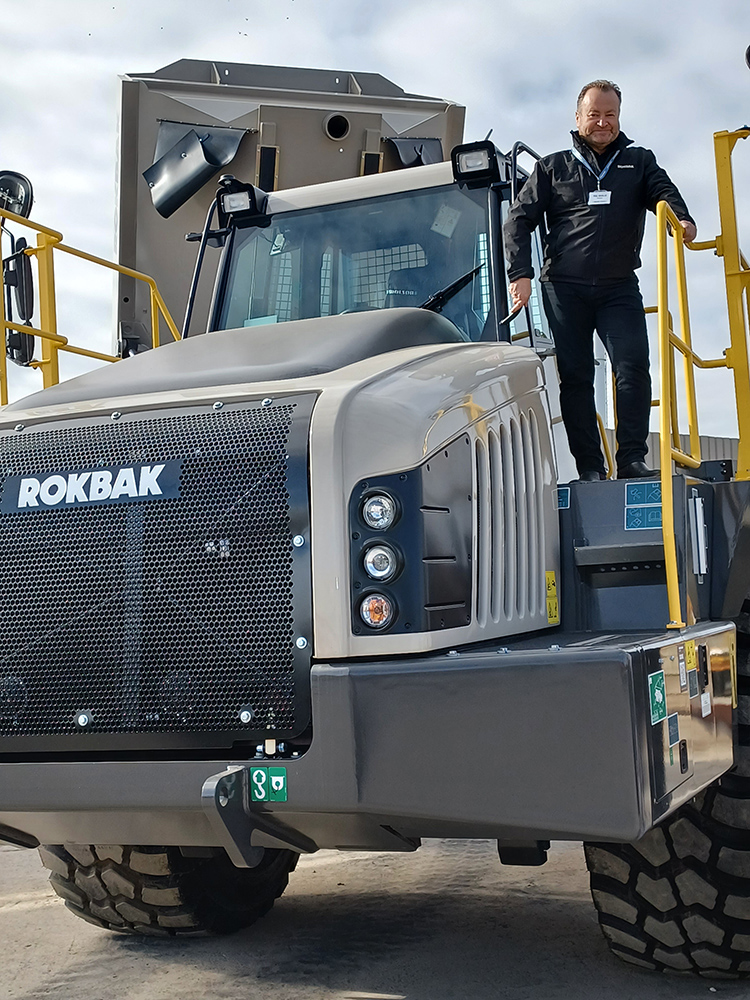
The Rokbak brand was finally revealed on September 1st 2021 – gratifyingly taking the media, customers, and the competition by surprise – and the public reaction was music to Douglas’ ears.
“The momentum built quickly, with customers and dealers alike eager to get their hands on Rokbak-branded products, whether that was haulers, work wear or coffee mugs,” he said. “Seeing the news bouncing around social media was great, too, perhaps the best feedback you can get.
“When people see the new Sand paint job in real life, they are blown away – it looks incredible on the iron. We’ve been out at a few trade shows and open days this year – including Hillhead, Balmoral Show and ScotPlant – and the feedback has been that our haulers were the best-looking pieces of equipment on site!”
The success of the entire rebranding project was also recognised by a wider audience when the company walked away from the Star Awards 2022 with five accolades from the Marketing Society, as well as a CeeD Industry Award at the start of the year.
One of several world premieres from Doosan at bauma 2022 is the launch of the company’s new 4x4 articulated dump truck (ADT).
Complementing the company’s standard range of 6x6 ADT models, the new 4x4 version of the DA45-7 ADT is intended to compete with rigid dump trucks (RDTs) in the 40-tonne class.
The new 4x4 DA45-7 ADT complements the manufacturer’s current range of Stage V-compliant 6x6 ADTs, which includes the DA30-7 and DA45-7 models with payloads of 28 and 41 tonnes, respectively.
In the new 4x4 ADT, the front truck and cab unit is the same as in the original 6x6 model, with modifications being made on the rear dumper unit only. Featuring a ZF EP8-420 transmission, the 4x4 DA45-7 is a two-axle ADT with twin wheels at the rear, and with a dumper section similar to that on RDTs in the 40-tonne class.
“With superior operation on poorer roads, smoother surfaces and steeper terrain, the aim of our new 4x4 machine is to challenge RDTs in the 40-tonne class, by providing a dumper product that delivers much more than RDTs,” said Beka Nemstsveridze, ADT product manager at Doosan.
As well as performing better in conditions that are tough for RDTs, the new 4x4 DA45-7 ADT has a width of less than 4m to avoid the need for special transportation and offers a better turning radius than a comparable RDT. The shorter turning radius and the design of the rear dumper unit, which is more suited to carrying flat and heavy rocks, provide particular advantages in the mining and tunnelling industries.
The latter are growing markets for ADTs, and include pioneering, short-term mining projects, quarrying and contract mining industries, especially those in southern Africa, the UK and Australia.

